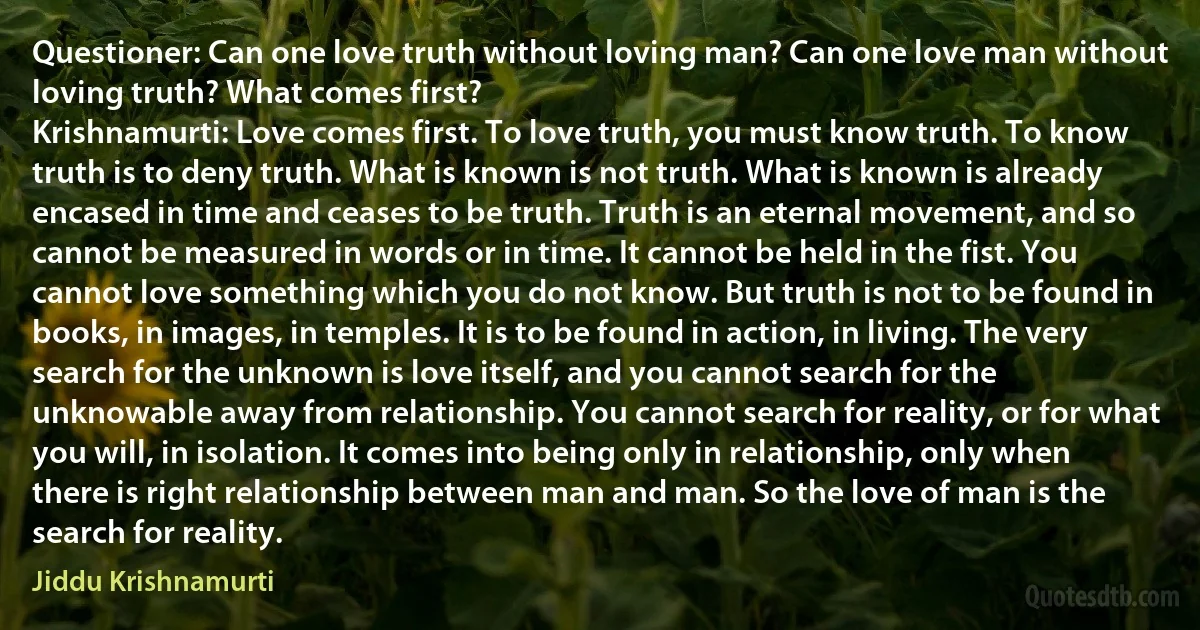
Questioner: Can one love truth without loving man? Can one love man without loving truth? What comes first? Krishnamurti: Love comes first. To love truth, you must know truth. To know truth is to deny truth. What is known is not truth. What is known is already encased in time and ceases to be truth. Truth is an eternal movement, and so cannot be measured in words or in time. It cannot be held in the fist. You cannot love something which you do not know. But truth is not to be found in books, in images, in temples. It is to be found in action, in living. The very search for the unknown is love itself, and you cannot search for the unknowable away from relationship. You cannot search for reality, or for what you will, in isolation. It comes into being only in relationship, only when there is right relationship between man and man. So the love of man is the search for reality.
Jiddu KrishnamurtiRelated topics
action comes found fist hold known living love loving man questioner right search something time truth unknown words unknowableRelated quotes
Sacredness is the essence of religion. You know, a great river may become polluted as it flows past a town, but if the pollution isn't too great, the river cleanses itself as it goes along, and within a few miles it is again clean, fresh, pure. Similarly, when once the mind comes upon this sacredness, then every act is a cleansing act. Through its very movement the mind is making itself innocent, and therefore it is not accumulating. A mind that has discovered this sacredness is in constant revolution - not economic or social revolution, but an inner revolution through which it is endlessly purifying itself. Its action is not based on some idea or formula. As the river, with a tremendous volume of water behind it, cleanses itself as it flows, so does the mind cleanse itself when once it has come upon this religious sacredness.

Jiddu Krishnamurti
My God! I have often regretted that I was born! I have often wished to fall back even into nothingness, rather than advance through so many falsehoods, so many sufferings, and so many successive losses, towards that loss of ourselves which we call death! Still, even in those moments of terrible faintheartedness, when despair overmasters reason, and when man forgets that life is a task imposed upon him to finish, I have always said to myself: "There are some things which I would regret not to have tasted - a mother's milk, a father's love, that relationship of heart and soul between brothers, household affections, joys, and even cares!" Our family is evidently our second self, more than self, existing before self, and surviving self with the better part of self. It is the image of the holy and loving unity of beings revealed by the small group of creatures who hold to one another, and made visible by feeling!

Alphonse de Lamartine
From what can "ought" be derived. The most compelling answer is this: ethics must be somehow based on an appreciation of human nature - on a sense of what a human being is or might be, and on what a human being might want to have or want to be. If that is naturalism, then naturalism is no fallacy. No one could seriously deny that ethics is responsive to such facts about human nature. We may just disagree about where to look for the most compelling facts about human nature -n novels, in religious texts, in psychological experiments, in biological or anthropological investigations. The fallacy is not naturalism but, rather, any simple-minded attempt to rush from facts to values. In other words, the fallacy is greedy reductionism of values to facts, rather than reductionism considered more circumspectly, as the attempt to unify our world-view so that out ethical principles don't clash irrationally with the way the world is.

Daniel Dennett
I seek a light that shall be new, yet old, the oldest indeed of all lights.... I seek not science, not religion, not Theosophy, but Veda-the truth about Brahman, not only about His essentiality, but about His manifestation, not a lamp on the way to the forest, but a light and a guide to joy and action in the world, the truth which is beyond opinion, the knowledge which all thought strives after-yasmin vijñate sarvam vijñatam [which being known, all is known]. I believe that Veda to be the foundation of the Sanatan Dharma; I believe it to be the concealed divinity within Hinduism,-but a veil has to be drawn aside, a curtain has to be lifted. I believe it to be knowable and discoverable. I believe the future of India and the world to depend on its discovery and on its application, not to the renunciation of life, but to life in the world and among men.

Sri Aurobindo
In my tender years and bairn-age, at schools, having on the one part contracted a loving familiaritie with a certain gentleman a papist, and on the other part being attentive to the sermons of that worthy man of God, Maister Christopher Goodman, teaching upon the Apocalyps, I was moved in admiration against the blindness of papists that could not most evidentlie see their seven hilled Citie of Rome, painted out there so lively by Saint John, as the Mother of all Spiritual Whoredome: that not onlie bursted I oute in continuall reasoning against my said familiar, but also from thence forth I determined with myself by the assistance of God's spirit to employ my study and diligence to search out the remanent mysteries of that holy booke (as to this houre praised be the Lord I have bin doing at all such times as convenientlie I might have occasion) &c.

John Napier
